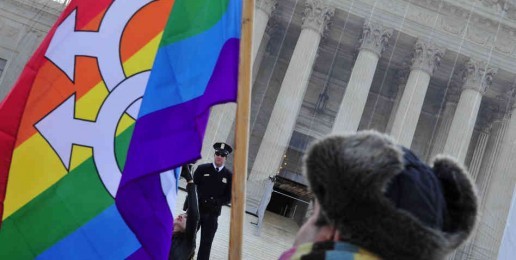
As you know, on Tuesday, the U.S. Supreme Court heard oral arguments on whether to affirm or overturn the Court rulings that nullified the votes of 7 million Californians. Those voters approved an Amendment to their constitution to preserve marriage as a unique union between the two sexes. The supporters of homosexual marriage, who claim to have the public and history on their side, didn’t like what the voters in this blue state did, so they took the matter to courts that had been loaded with liberal judges over the years.
Often overlooked this week in the coverage is that Proposition 8 occurred in response to an earlier ruling by activist California courts overturning an earlier vote of the people (Prop. 22) affirming marriage between a man and a woman.
Wednesday, the U.S. Supreme Court heard oral arguments in a challenge to the 1996 Defense of Marriage Act (DOMA), which was passed to protect states like Illinois from having to recognize same-sex marriage. DOMA passed overwhelmingly, by a vote of 342-67 in the U.S. House and 85-14.
Massachusetts cannot dictate what public policy on marriage should be to all other states. The law had (still has) strong legal precedent. In a landmark 1939 case called the Pacific Employers Insurance Co. v. Industrial Accident, the U.S. Supreme Court ruled on the question of the Full Faith and Credit Clause of the Constitution. The court said,
“A State is not bound, apart from the compulsion of the full faith and credit clause, to enforce the laws of another State, nor, by its own statute, may it determine the choice of law to be applied in the other. Full faith and credit does not here enable one state to legislate for the other or to project its laws across state lines so as to preclude the other from prescribing for itself the legal consequences of acts within it.”
You might never know this given the coverage of the DOMA hearing this week, in which the media ran with the highly speculative story that DOMA was in trouble. It may or may not be. I have heard from observers who feel that Paul Clement, former U.S. Solicitor General, gave the strongest performance in defense of DOMA of any attorney in either case in the two days of oral arguments.
For all the claims that natural marriage is a losing issue, (which begs the question of why these matters are in the courts at all), there is polling out there which may explain why liberals want to use courts to force the unraveling of marriage upon America.
First, there is an enormous poll from Reuters conducted over the last three months involving 24,455 people which found that only 41 percent of Americans said that they support same-sex marriage. Fox News most recent poll found Americans virtually evenly split on the issue. This fits into a story this week in the liberal Washington Post entitled, “Is support for Gay Marriage Over-Sold?”
The Post story points out that when one looks at the most actual votes by the people, the polls routinely underestimate support for natural marriage by seven points. The article admits that this is due in part because of the hostility toward people of traditional values. People are afraid to say how they really feel about homosexual marriage in this culture. Another factor that occurs on Election Day is that those who support natural marriage feel more strongly about it, than do those who want to restructure marriage.
What does it all mean? Supporters of natural marriage have no reason to hang our heads, or to act as if this battle is lost simply because of a media narrative to the contrary. (Few people know that over 10,000 people were in Washington on Tuesday to rally in support of traditional marriage, a large portion of whom were Hispanic and African-American.)
Prayer and support for those fighting for marriage is very important. This issue is far from over.






























